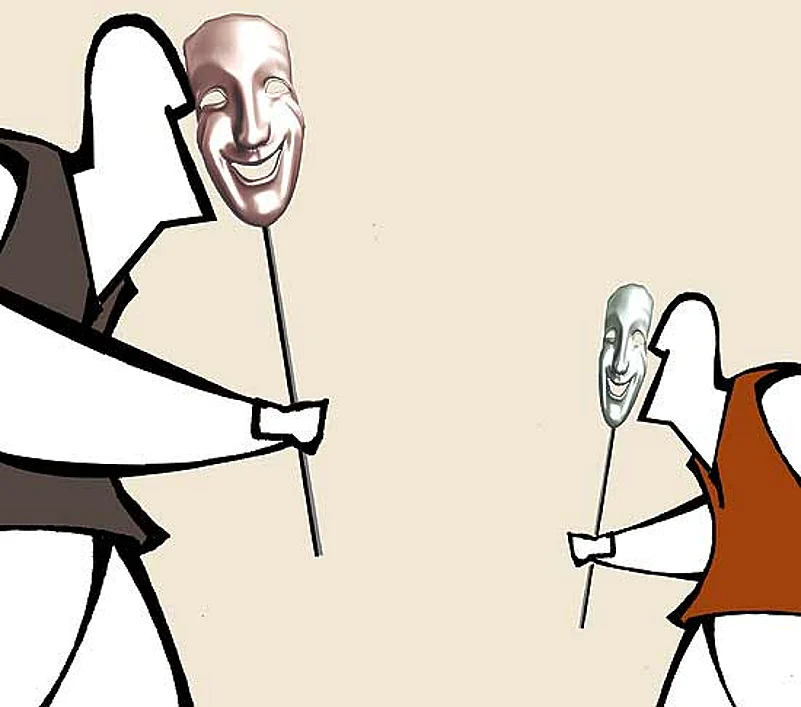Behind the latest Lokpal fiasco and the farce that has been on since April 2011, we may identify five deadly flaws in our polity, displayed by all the actors involved—the Congress and the BJP, smaller parties like the Samajwadi Party, the BSP, the RJD and the Trinamool Congress, and the members of campaigner Anna Hazare’s team. The flaws they all displayed in equal measure are hypocrisy, arrogance, selfishness, opportunism and shortsightedness.
First, let us look at the political class, chiefly the Congress. The old saw goes that the way to hell is paved with good intentions, but the Congress paved its path to perdition all along with bad intentions. Its opportunism is evident in the way it formed a joint drafting committee with Anna’s team members even as its dirty tricks department orchestrated and kept up a campaign of calumny against them. All this when it had no intention of conceding any of the substantial demands of the team, such as keeping the government’s say in the appointment and dismissal of the Lokpal to a minimum or empowering the Lokpal with independent investigating and prosecuting mechanisms. Instead, to appease those who stand accused of corruption, in its final bill, the Congress promised to defend them with public money and, showing its vindictiveness, it framed the bill so as to cover more civil society bodies than government employees. In the same vein, the final bill also proposed harsher punishment for those who file so-called flimsy complaints than for those found guilty of corruption—as if the bill were designed to ensure that few people risk their necks to complain against corruption.
The Congress’s hypocrisy is also evident in how it subverted the ‘sense of the House’ resolution and in the way it said all along (and is still farcically saying) that it is committed to a strong Lokpal. Its selfishness is clear in its obvious desire to shield its government from any intrusive corruption probe by the proposed Lokpal and its arrogance in its thinking that it can confuse public anger against corruption forever by setting its dirty tricks department upon Anna’s team. Its arrogance is also in evidence in its assumption that its stint in coalition is temporary and so it can manipulate its coalition partners.
The overall shortsightedness that goes with this sort of behaviour has worsened the policy paralysis it suffers from and is now threatening to derail even other socially relevant legislations, such as the food security and the communal violence bills. At the end of the day, what will the UPA go with to woo its constituents? The answer is, probably with future promises of reservation and so on, even as past promises remain unfulfilled.
The BJP’s hypocrisy and selfishness are evident in how it never gave a constructive suggestion on the Lokpal but always demanded that the government first come out with its own draft, in how it wanted to have the prime minister under the Lokpal but not its chief ministers under Lokayuktas and in its taking more interest in defeating the government in Parliament than using its numbers to force the government to pass a strong and effective Lokpal law. The BJP’s opportunism is also obvious in how it used Anna’s agitation to corner the government without any intention of bringing a Lokpal into being.
The BJP, like the rest, also betrayed its arrogance and shortsightedness. This it did by believing it will invite no taint on itself in the public eye by its selfish, hypocritical and opportunistic behaviour. The smaller parties, too, showed these flaws in betraying the ‘sense of the House’ resolution they all had helped pass under pressure from the public support behind Anna’s team during the previous session of Parliament.
Now for the members of Anna’s team. They should work out for themselves why they have cut such a sorry figure. They were arrogant in assuming that they represented all public opinion and all wisdom on Lokpal even when they were aware of serious reservations in civil society itself about many aspects of the gargantuan Lokpal they proposed. They were hypocritical in denying all links with the RSS and its various outfits, including the BJP, even as the parivar organisations never hid their role in the Anna agitation. They were opportunistic in rooting for partisan election campaigns, though claiming the moral halo of non-partisan politics. This also betrayed their shortsightedness. Their moral arrogance, even when their key member failed to provide ethically consistent answers to the government’s charges, left the public disillusioned.
The betrayal by the public representatives might provide a ground for public action, but the leaders of this action, whoever they be, would have to show the wisdom to lead with moral sincerity and humility. Otherwise, it would amount to wasting an important opportunity.


























